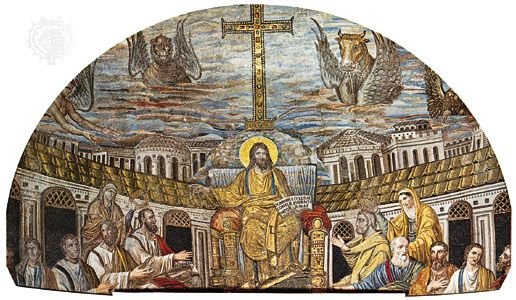In the Bible, numbers often carry symbolic and spiritual significance. One such number is 3, which holds great meaning in Christianity. In this article, we will explore the biblical significance of the number 3 and its role in shaping religious beliefs and interpretations.
Key Takeaways:
- The number 3 represents the concept of completeness and divine perfection in the Bible.
- It symbolizes the Holy Trinity – the coexistence of God the Father, Son, and Holy Spirit.
- Multiple occurrences of the number 3 in biblical stories signify divine revelation, resurrection, and spiritual transformation.
- Significant biblical events, such as Jesus’ resurrection on the third day, are associated with the number 3.
- The number 3 represents the three theological virtues – faith, hope, and love.
Table of Contents
Symbolism of the Number 3 in the Bible

In the Bible, the number 3 holds significant symbolic meaning, representing important concepts and ideas. It is often associated with the Trinity, completeness, divine perfection, and the union of God and man. Let’s explore the spiritual depth and symbolic significance of the number 3 in the Scriptures.
The Trinity:
One of the most notable symbols of the number 3 in the Bible is its representation of the Holy Trinity – God the Father, God the Son (Jesus Christ), and God the Holy Spirit. The concept of the Trinity is fundamental to Christian theology, and the number 3 beautifully embodies the unity and harmonious relationship between the three distinct persons of God.
Completeness:
The number 3 is often associated with completeness, wholeness, and totality in the Bible. We see this symbolism in various aspects, such as the three days it took for Jesus to rise from the dead, signifying the complete victory over sin and death. Additionally, the act of baptism, which represents spiritual rebirth and entry into the body of Christ, is often performed using the formula “in the name of the Father, Son, and Holy Spirit” – a trinitarian declaration emphasizing the completeness of God’s presence.
Divine Perfection:
The number 3 is a symbol of divine perfection in the Bible. Just as God is perfect in His nature, the number 3 exemplifies perfection. We see this symbolism in various instances, such as Jesus being tempted three times by Satan in the wilderness, reflecting the perfection of His resistance to temptation and His ultimate victory over evil.
The Union of God and Man:
The number 3 also represents the union of God and man. In the person of Jesus Christ, who is both fully God and fully man, we witness the divine and human nature perfectly coming together as one. This unity is symbolized by the number 3, emphasizing the profound connection between God and humanity.
| Symbolism of the Number 3 in the Bible | Meaning |
|---|---|
| The Trinity | Representation of Father, Son, and Holy Spirit |
| Completeness | Totality, wholeness, and fulfillment |
| Divine Perfection | Symbolizes God’s perfection and victory over evil |
| Union of God and Man | The coming together of divinity and humanity |
Biblical Interpretation of the Number 3

Throughout the Bible, the number 3 holds great significance and carries profound symbolism. From divine revelations to spiritual transformations, multiple occurrences of the number 3 in various biblical stories point towards deeper meanings and profound messages. Let’s explore the biblical interpretation of the number 3 and its connection to key themes in biblical numerology.
The number 3 is often associated with divine completeness and perfection, reflecting the unity of the Holy Trinity – the Father, Son, and Holy Spirit. Just as the Holy Trinity represents the wholeness of God’s nature, the number 3 symbolizes divine perfection in various aspects. It signifies the harmony and interconnection between the three persons of the Trinity, highlighting the unity and completeness found in God’s eternal nature.
Biblically, the number 3 is frequently linked to resurrection and new life. The resurrection of Jesus Christ, occurring on the third day after His crucifixion, exemplifies the transformative power and triumph over death associated with the number 3. This pivotal event in Christianity highlights the divine significance of the number 3 as a symbol of rebirth, renewal, and spiritual transformation.
In addition to these themes, there are several other significant references to the number 3 in the Bible. For instance, Jonah spent three days and three nights in the belly of the whale, foreshadowing Jesus’ resurrection. The three temptations faced by Jesus in the wilderness and His threefold denial by Peter also depict significant spiritual trials and lessons. These instances further emphasize the number 3 as a marker of divine intervention, testing, and profound change.
Overall, the biblical interpretation of the number 3 encompasses its representation of divine completeness, the Trinity, resurrection, and spiritual transformation. It serves as a recurring symbol throughout the Bible, signaling God’s presence, grace, and a call to deeper understanding. The number 3 invites contemplation and reflection on the profound mysteries and teachings of the Christian faith.
Biblical References to the Number 3
The significance of the number 3 in the Bible is evident through numerous biblical references where it holds symbolic meaning. Let us explore some of the most notable instances where the number 3 plays a significant role in biblical narratives.
The Three Days of Jesus’ Resurrection
One of the most profound biblical references to the number 3 can be found in the three days that Jesus spent in the tomb before His resurrection. This event symbolizes not only Christ’s victory over death but also signifies a new beginning, the completion of God’s plan for salvation.
Peter’s Denial of Jesus Three Times
Another powerful biblical reference involving the number 3 is Peter’s denial of Jesus three times. This event captures the humanity and fallibility of Peter, while also serving as a reminder of God’s forgiveness, redemption, and the power of transformation.
The Trinity: Father, Son, and Holy Spirit
The concept of the Holy Trinity, which represents the coexistence of God as the Father, Son, and Holy Spirit, is deeply rooted in the significance of the number 3. Through this trinitarian nature, God reveals Himself to humanity, emphasizing unity, completeness, and perfection.
These are just a few examples of how biblical references to the number 3 hold profound significance in the Bible. The number 3 represents divine completeness, harmony, and the manifestation of God’s power throughout Scripture.
The Significance of the Third Day in the Bible
In the Bible, the third day holds great biblical significance. It is a day marked by divine intervention, fulfillment of prophetic events, and the beginning of new beginnings.
The third day is first mentioned in the book of Genesis, where God creates the heavens and the earth, separating the waters from the dry land. On the third day, God said, “Let the waters under the heavens be gathered together into one place, and let the dry land appear.” And it was so (Genesis 1:9). This day signifies the formation of a stable environment for life to flourish, setting the stage for the subsequent days of creation.
The third day also plays a crucial role in the story of Jesus’ resurrection. According to the Gospels, Jesus was crucified on Friday, which was the preparation day for the Sabbath. He was then buried and remained in the tomb on the Sabbath, which was the second day. However, on the third day, Jesus triumphantly rose from the dead, fulfilling prophecies and securing salvation for all who believe in Him. This event is central to the Christian faith and symbolizes victory over sin and death.
“He then began to teach them that the Son of Man must suffer many things and be rejected by the elders, the chief priests and the teachers of the law, and that he must be killed and after three days rise again.” – Mark 8:31
The biblical significance of the third day extends beyond creation and the resurrection. It appears in several other key events throughout the Bible. For instance, on the third day after the Israelites’ arrival at Mount Sinai, God descended upon the mountain and revealed Himself to Moses, giving him the Ten Commandments and establishing His covenant with the people (Exodus 19:16-20). Additionally, the story of Jonah’s deliverance from the belly of the fish signifies redemption and a new beginning on the third day (Jonah 1:17).
Overall, the third day in the Bible represents fulfillment, transformation, and divine intervention. It is a day of new beginnings, where God’s power is displayed, prophecies are fulfilled, and salvation is made possible. The biblical significance of the third day underscores the importance of patience, trust, and faith in God’s perfect timing and plan.
| Event | Biblical Reference |
|---|---|
| Creation of the dry land | Genesis 1:9 |
| Jesus’ resurrection | Matthew 28:1-10, Mark 16:1-8, Luke 24:1-53, John 20:1-31 |
| God’s revelation to Moses | Exodus 19:16-20 |
| Jonah’s deliverance | Jonah 1:17 |
The Number 3 in Christianity
In Christianity, the number 3 holds significant spiritual and symbolic meaning. It is closely linked to the concept of the Holy Trinity, which represents the triune nature of God as the Father, Son, and Holy Spirit. The Trinity is a central doctrine in Christian theology and embodies the unity and coexistence of these three divine entities.
The number 3 also relates to the three theological virtues: faith, hope, and love. These virtues are considered fundamental in Christian teachings and guide believers in their spiritual journey. The number 3 symbolizes the interconnection and harmony between these virtues, emphasizing their importance in living a righteous and faithful life before God.
Furthermore, the number 3 represents God’s divine nature and presence. Just as the Trinity comprises three distinct yet inseparable persons, the number 3 reflects the multifaceted nature of God. It signifies the completeness and perfection of God’s work, as seen in the three days of creation and the threefold repetition of divine attributes in the Bible.
“For there are three that bear witness in heaven, the Father, the Word, and the Holy Spirit; and these three are one.” – 1 John 5:7
According to biblical interpretation, the number 3 is also associated with divine revelation, resurrection, and spiritual transformation. It is prominently featured in significant biblical events such as Jesus’ resurrection on the third day and Peter’s three denials before the crucifixion.
To summarize, the number 3 holds great significance in Christianity. It represents the Holy Trinity, the three theological virtues, and reflects God’s divine nature and presence. Understanding the symbolism of the number 3 enhances our understanding of Christian teachings and deepens our connection with God.
| Symbolism of the Number 3 in Christianity | Biblical References | Significance |
|---|---|---|
| 1. Holy Trinity | Matthew 28:19 | Represents the triune nature of God |
| 2. Three Theological Virtues | 1 Corinthians 13:13 | Emphasizes the interconnectedness of faith, hope, and love |
| 3. Divine Nature | Genesis 1:1-3 | Reflects God’s completeness and perfection |
| 4. Resurrection and Spiritual Transformation | Matthew 12:40, Acts 10:40 | Associated with divine revelation and spiritual growth |
Biblical Significance of Trinity
The Trinity holds immense biblical significance in the realm of Christianity. It represents the triune nature of God, depicting the coexistence of the Father, Son, and Holy Spirit in a harmonious union. The number 3 within the Trinity serves as a powerful symbol that helps us understand the mysterious nature of God.
The concept of the Trinity is deeply rooted in biblical teachings. In the New Testament, we find references to the Father, Son, and Holy Spirit existing as distinct persons within the Godhead. These three entities are separate and yet inseparable, reflecting the divine nature of God.
The number 3 in the Trinity signifies the perfect unity and completeness of God. Each member of the Trinity plays a unique role in God’s divine plan for salvation. The Father is the creator and sustainer of all things, the Son is the redeemer and savior of humanity, and the Holy Spirit is the comforter and guide in the lives of believers.
To further comprehend the biblical significance of the Trinity, we can explore the metaphorical references to the number 3 throughout the Bible. One notable example is the three-fold repetition of the phrase “Holy, Holy, Holy” in Isaiah 6:3, which emphasizes the holiness and divine perfection of God.
Additionally, the number 3 holds great significance in the life of Jesus Christ. Jesus’ ministry lasted for approximately three years, and he rose from the dead on the third day after his crucifixion. These events highlight the transformative power and resurrection associated with the number 3 in the biblical narrative.
In understanding the significance of the Trinity, it is crucial to embrace the mystery and complexity of God’s nature. The number 3 serves as a reminder that our limited human comprehension cannot fully comprehend the vastness and greatness of God.
Comparison of the Trinity in Different Christian Denominations
| Denomination | Beliefs about the Trinity |
|---|---|
| Catholicism | Believe in the coequal and consubstantial nature of the Father, Son, and Holy Spirit. Recognize the Trinity as one God in three persons. |
| Eastern Orthodoxy | Hold similar beliefs to Catholicism, emphasizing the unity and equality of the three persons in the Trinity. |
| Protestantism | Varies across different Protestant denominations. Some emphasize the unity and equality of the Trinity, while others emphasize the roles and functions of each person. |
| Non-Trinitarian Christian Sects | Do not believe in the traditional concept of the Trinity. They may reject the divinity of Jesus or hold alternative beliefs about the nature of God. |
Understanding the Numerological Significance of 3
In biblical numerology, the number 3 holds significant meaning and plays a crucial role in understanding divine patterns and messages. Let’s explore the numerological significance of the number 3 and its implications in the Bible.
Divine Completeness and Perfection
The number 3 often represents completeness and perfection in biblical numerology. Just as the Holy Trinity consists of the Father, Son, and Holy Spirit, the number 3 symbolizes the unity and perfection of God.
Divine Revelation and Spiritual Transformation
The number 3 is associated with divine revelation and spiritual transformation. In the Bible, we see numerous instances where significant events occurred on the third day, such as the resurrection of Jesus Christ. This emphasizes the transformative power of the number 3.
Trials and Resurrection
The number 3 also represents trials and resurrection. For example, Jesus predicted three times that Peter would deny him before the rooster crowed. This threefold denial foreshadowed not only Peter’s trial but also his subsequent restoration and redemption.
Symbols of Unity and Harmony
Furthermore, the number 3 signifies unity and harmony. Just as a cord of three strands is not easily broken, the interplay between three elements provides strength and stability. This symbolism is seen in the Holy Trinity, where the Father, Son, and Holy Spirit exist as one.
| Symbolism | Explanation |
|---|---|
| Completeness and Perfection | The number 3 represents the completeness and perfection of God. |
| Divine Revelation and Spiritual Transformation | Events occurring on the third day reveal divine truths and lead to spiritual transformation. |
| Trials and Resurrection | The number 3 is associated with trials and eventual resurrection or restoration. |
| Symbols of Unity and Harmony | The number 3 symbolizes unity and harmony, as seen in the Holy Trinity. |
Through its numerological significance, the number 3 offers deep spiritual insights and serves as a divine symbol of completeness, transformation, unity, and harmony in the Bible.
Conclusion
In conclusion, the number 3 holds significant spiritual and symbolic meaning in the Bible. Throughout this article, we have explored its significance in biblical numerology, its symbolism, and its interpretation in various biblical references.
The number 3 represents the concept of completeness and divine perfection. It is often associated with the Trinity, symbolizing the coexistence of the Father, Son, and Holy Spirit. Moreover, the number 3 is connected to important biblical events, such as Jesus’ resurrection after three days and Peter’s denial of Jesus three times.
Biblical interpretation of the number 3 reveals its connection to divine revelation, resurrection, and spiritual transformation. It is a number that brings about fulfillment and represents the ultimate expression of God’s power and grace.
Understanding the symbolism and significance of the number 3 in Christianity allows us to deepen our spiritual understanding and appreciate the intricate messages conveyed throughout the Bible. It encourages us to reflect on the divine nature of God and the profound mysteries of faith.
This article is a part of our series on Numerology in the Bible, where we dive deep into the meanings behind the numbers. Stick with us as we uncover more!
FAQ
What does the number 3 mean in the Bible?
The number 3 holds significant symbolic and spiritual meaning in the Bible. It represents concepts such as divine perfection, completeness, and the union of God and man.
What is the symbolism of the number 3 in the Bible?
The number 3 symbolizes important concepts in the Bible, including the Trinity, the union of Father, Son, and Holy Spirit; completeness; divine perfection; and the connection between God and man.
How is the number 3 interpreted in biblical numerology?
In biblical numerology, the number 3 is interpreted as a number of divine revelation, resurrection, and spiritual transformation. Its multiple occurrences in various biblical stories carry significant meaning.
Are there any specific biblical references to the number 3?
Yes, the Bible contains various references to the number 3. Some notable instances include the three days of Jesus’ resurrection and Peter’s denial of Jesus three times.
What is the significance of the third day in the Bible?
The third day holds great significance in the Bible. It is connected to important events such as the creation story, the resurrection of Christ, and the fulfillment of prophecies.
How does the number 3 hold significance in Christianity?
In Christianity, the number 3 is significant as it represents the Holy Trinity, the three theological virtues (faith, hope, and love), and God’s divine nature and presence.
What is the biblical significance of the Trinity?
The Trinity is at the core of Christian belief, and the number 3 reflects its biblical significance by representing the coexistence and triune nature of God—the Father, Son, and Holy Spirit.
What is the numerological significance of the number 3 in the Bible?
The number 3 holds numerological significance in biblical interpretation. It helps unveil divine patterns and messages, allowing a deeper understanding of God’s plan and His interaction with humanity.

Rockin’ the faith, one verse at a time!
Growing up, the Bible’s stories deeply impacted me. Now, with over 15 years of preaching experience, I blend timeless teachings with modern technology, making them relevant for today’s world.
Bible Hub Verse is my platform to share historical insights and thought-provoking articles, exploring both familiar and uncommon Christian topics. My passion is building a welcoming online space for everyone to learn, grow in their faith, and discover the Bible’s enduring message.
Join the journey!
God bless you.






